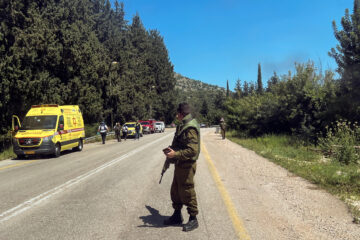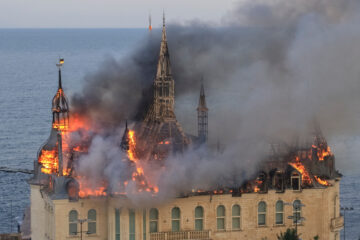Major powers agree ceasefire plan for Syria
Major powers agreed on Friday to a cessation of hostilities in Syria set to begin in a week and to provide rapid humanitarian access to besieged Syrian towns, but failed to secure a complete ceasefire or an end to Russian bombing.
Following a marathon meeting in Munich aimed at resurrecting peace talks that collapsed last week, the powers, including the United States, Russia and more than a dozen other nations, reaffirmed their commitment to a political transition when conditions on the ground improved.
At a news conference, U.S. Secretary of State John Kerry acknowledged the Munich meeting produced commitments on paper only.
"What we need to see in the next few days are actions on the ground, in the field," he said, adding that "without a political transition, it is not possible to achieve peace."
Russian Foreign Minister Sergei Lavrov told the news conference that Russia would not stop air attacks in Syria, saying the cessation of hostilities did not apply to Islamic State and al Nusrah, which is affiliated with al Qaeda. Islamic State militants control large parts of Syria and Iraq
"Our airspace forces will continue working against these organizations," he said.
The United States and European allies say few Russian strikes have targeted those groups, with the vast majority hitting Western-backed opposition groups seeking to topple the government of President Bashar al-Assad government.
Lavrov said peace talks should resume in Geneva as soon as possible and that all Syrian opposition groups should participate. He added that halting hostilities would be a difficult task.
But British Foreign Secretary Philip Hammond said ending fighting could only succeed if Russia stopped air strikes supporting Syrian government forces\’ advance against the opposition.
Diplomats cautioned that Russia had until now not demonstrated any interest in seeing Assad replaced and was pushing for a military victory.
Russian Prime Minister Dmitry Medvedev on Thursday raised the specter of an interminable conflict or even a world war if powers failed to negotiate an end to five years of fighting in Syria, which has killed 250,000 people, caused a refugee crisis and empowered Islamic State militants.
Syria\’s main opposition group welcomed the plan by the world powers on Friday.
It cautioned, however, that the agreement must prove to be effective before it joins political talks with government representatives in Geneva.
Russia\’s intervention on the battlefield on behalf of Assad since last October has swung the momentum in the fight between the government and opposition forces. The latest advance over the past two weeks has seen government forces and allies rout rebels and come close to encircling Aleppo, a divided city half held by rebels for years.
The first peace talks in two years between belligerents in Syria fell apart last week before they began in the face of the advance by Assad\’s forces.
A senior French diplomat said: "The Russians said they will continue bombing the terrorists. They are taking a political risk because they are accepting a negotiation in which they are committing to a cessation of hostilities. If in a week there is no change because of their bombing, then they will bear the responsibility."
Washington is leading its own air campaign against Islamic State militants in eastern Syria and northern Iraq, but has resisted calls to intervene in the main battlefields of Syria\’s civil war in the west of the country, where the government is mostly fighting against other insurgent groups.
The communique of the plan reached in Munich said the powers had established a ceasefire task force, under the auspices of the United Nations, co-chaired by Russia and the United States, and including members having government and opposition groups.
The communique added that sustained humanitarian aid would begin this week to various besieged areas of Syria.
"Humanitarian access to these most urgent areas will be a first step toward full, sustained, and unimpeded access throughout the country," the joint communique added.
The Assad government for years has repeatedly promised humanitarian access but has rarely lived up to its promises. Western-backed rebels have also been accused of that.
SOURCE: REUTERS
[do_widget_area inner_adsbar]










